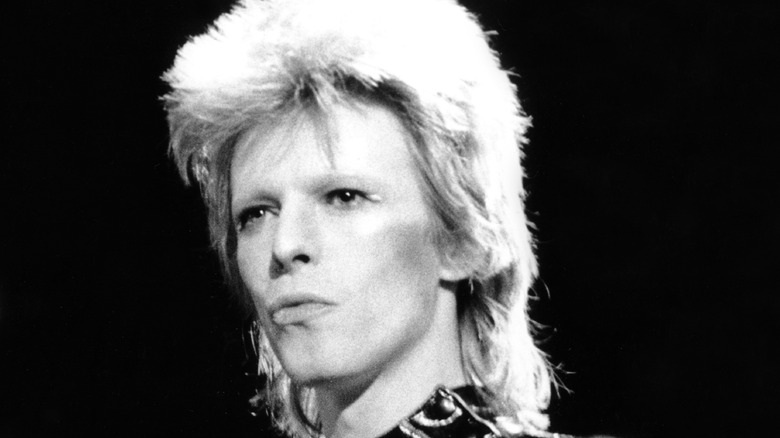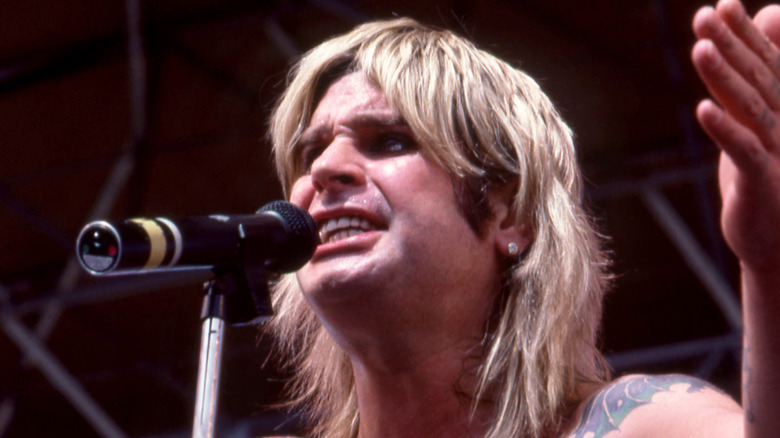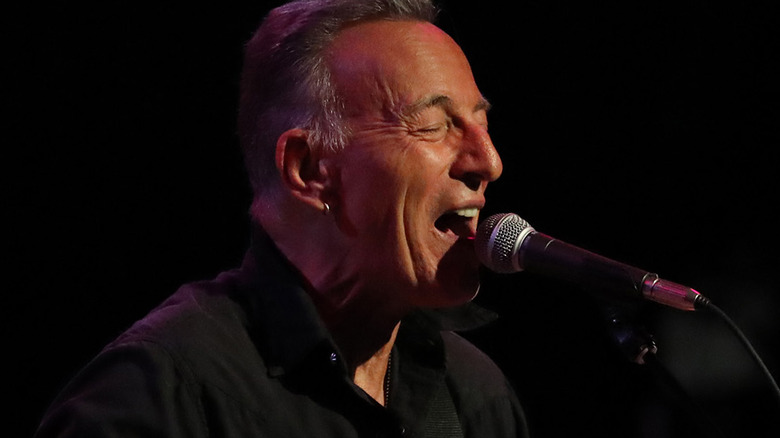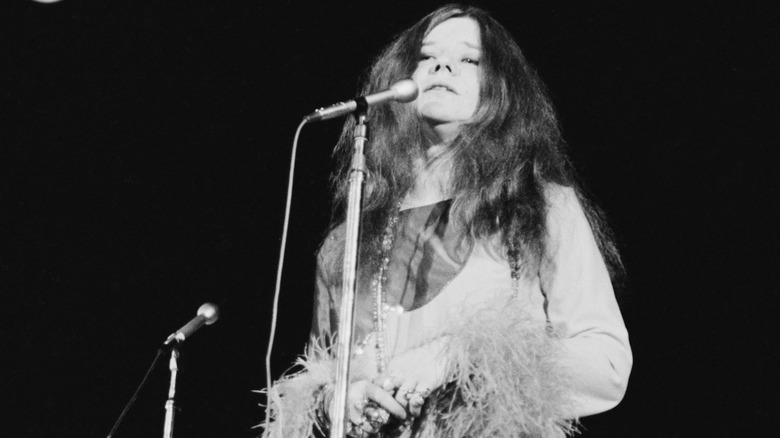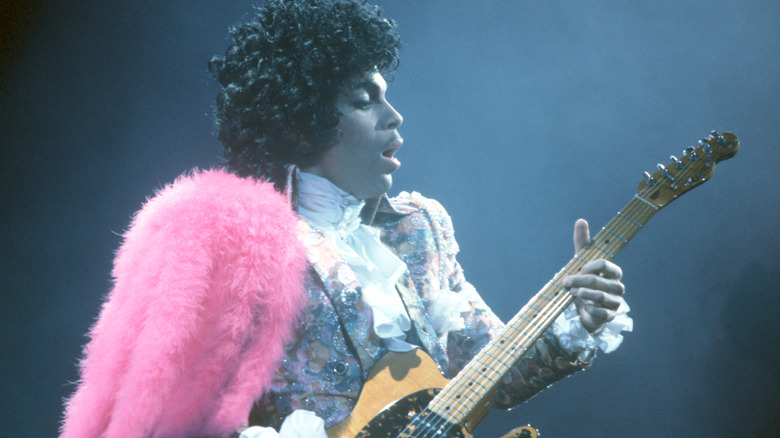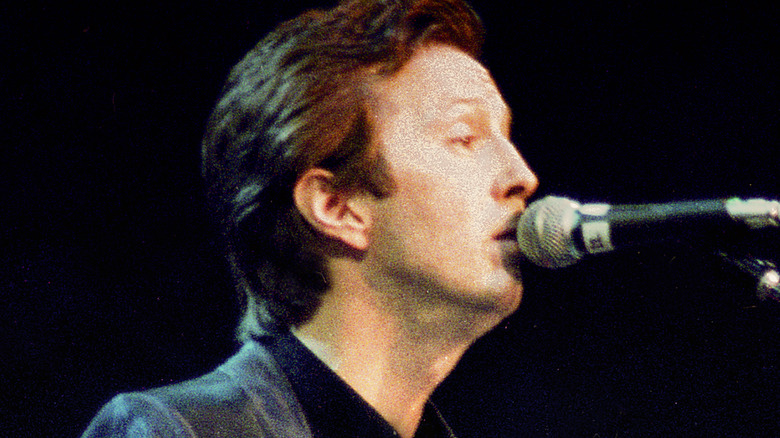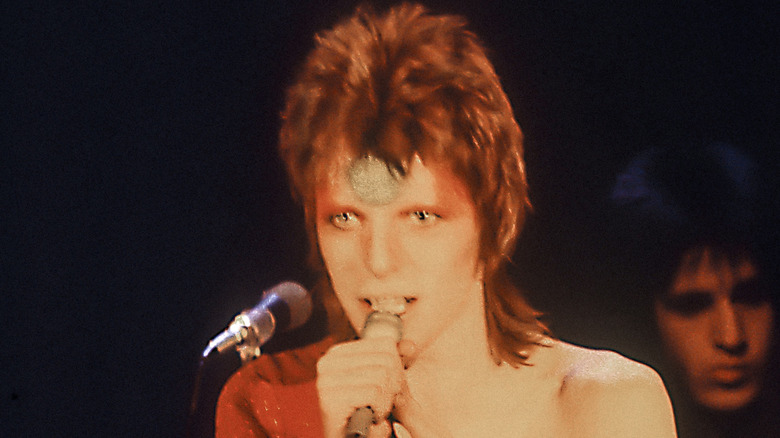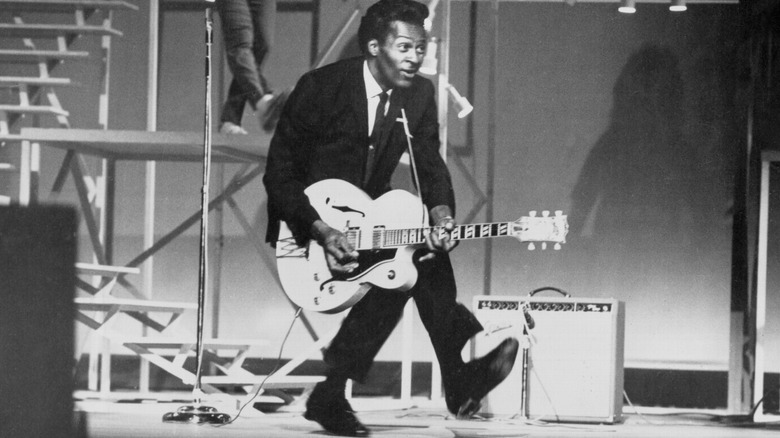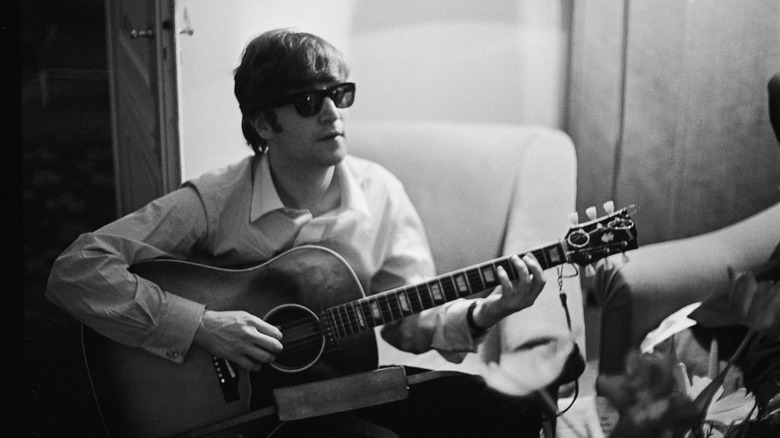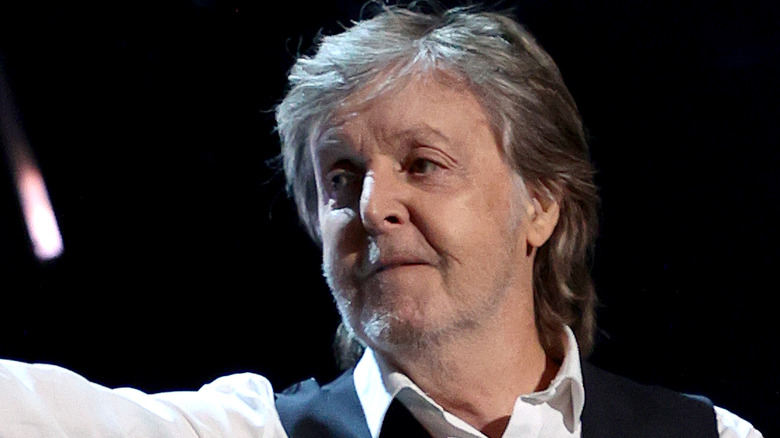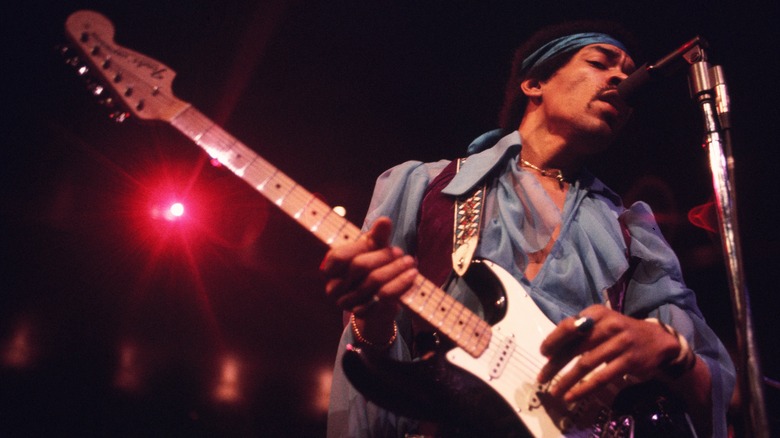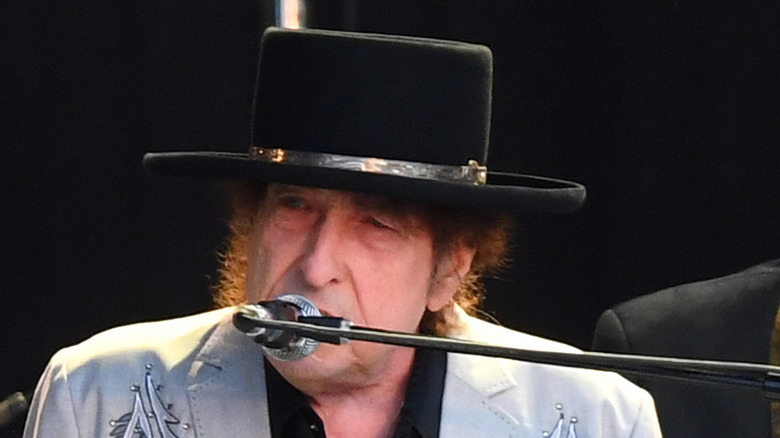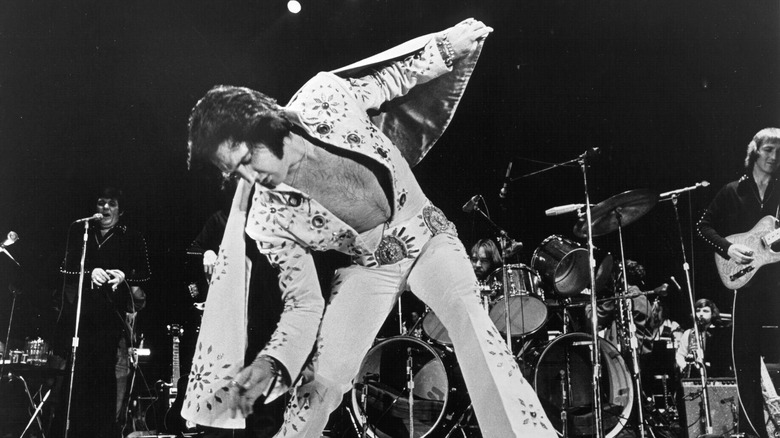The Most Important Solo Acts In Rock History
You don't need to be part of a band to change the world through music, as evidenced by the entire history of rock. Some of the following legends started off as part of legendary groups, like Black Sabbath or the Beatles, and went on to find influential success on their own after a split. Others started off as solo artists from the get-go, because their personalities and talents were too big for an artistic collective to contain. Most had supporting musicians at their back. But nobody went to see the E-street Band or the Experience. You go to see Bruce Springsteen and Jimi Hendrix.
So who are the most important solo artists in all of rock? Here's a decidedly non-exhaustive list.
Ozzy Osbourne
With Black Sabbath, Ozzy Osbourne helped invent heavy metal (per Rolling Stone). Any discussion of his influence, and theirs, must begin there. But by the end of the '70s, this gloomy, game-changing four piece seemed to be on its last legs. Osbourne himself, addicted to many substances and unable to properly perform, was part of the problem. He was fired in 1979, as per Loudwire. Sabbath would eventually replace him and keep touring. But as the world soon learned, Osbourne simply cannot be defeated.
Being fired from such a legendary group was only a temporary setback. Osbourne soon dusted himself off, found a guitar player — the legendary Randy Rhoads — and released "Blizzard of Ozz" in 1980. Biography notes that thanks to hit singles like "Crazy Train" and "Mr. Crowley," the album went on to achieve multi-platinum success and set the stage for Osbourne's legendary '80s career. Sadly, there were more setbacks in his future — including Rhoads' death in a 1982 plane crash (via Ultimate Classic Rock) and his being almost mortally wounded in a motorcycle accident in 2004, as noted by the Guardian. But neither tragedy, or even his legendary substance abuse, infamous stage antics, or accusations of devil worship, kept him down for long.
The Prince of Darkness has been to hell and back, and he wears it on his sleeve. It's almost incredible he's still capable of singing, or with us at all. But he's left behind a legacy more sober-minded artists would decapitate a bat for.
Bruce Springsteen
"In many ways, Bruce Springsteen is the embodiment of rock & roll," writes Jackson Browne for Rolling Stone. "Combining strains of Appalachian music, rockabilly, blues and R&B, his work epitomizes rock's deepest values: desire, the need for freedom and the search to find yourself."
That sums it up nicely. From the ripped jean vests to that telecaster to his iconic, raspy voice and those gigantic stadium anthems, Springsteen is the quintessential American rock icon. Everything about him and his music is stripped down to the bare essentials, but that's why it works.
Stephen Metcalf puts it wonderfully for Slate, calling Springsteen "a majestic American simpleton with a generic heartland twang, obsessed with cars, Mary, the Man, and the bitterness between fathers and sons." He goes on to say, "we need to see Springsteen's persona for what it really is: Jon Landau's middle-class fantasy of white, working-class authenticity."
There's no pomp, no glitter, no lasers or dry ice, no elaborate stage personas or layers of makeup. The "Born in the USA" singer is a working man's rocker; to him, those things are gimmicks that separate an artist from his audience. And someone who can connect so intimately with a crowd, and speak to their hearts with lyrics anyone can relate to, needs none of it. Rather than distracting you with fantasy, the Boss meets you right where you are, after work with a few buddies and some cheap beer in a plastic cup. And then he sweeps you away.
Janis Joplin
Elvis was the King. Bruce Springsteen is the Boss. Prince was Prince. And Janis Joplin was the Queen. "She wasn't just a great woman in rock," writes Roseanne Cash for Rolling Stone. "At the time she was the woman in rock. Janis really created this whole world of possibility for women in music: Without Janis Joplin, there would be no Melissa Etheridge. ... no Chrissie Hynde, no Gwen Stefani. There would be no one." Cash went on to say that Joplin's fearlessness and was the root of her passion and soul.
As NPR notes, Joplin came up alongside other counterculture icons, like Jimi Hendrix and Bob Dylan. But the road was rough for female rockers, for the same reason it's rough elsewhere: They were surrounded by naysayers who refused to believe women could play with the boys. Clearly, she proved them wrong. She had her feet planted firmly in the blues, but she could unleash all kinds of primal power in both the way she sang and the way she lived. Cash continues for Rolling Stone: "There had been blues singers who were wild and unrestrained — but even they tended to be a little more buttoned-down than Janis. She always seemed on the verge of being totally out of control."
Tragically, like so many other world-changing artists, she was taken from us too soon. But her legacy can be felt every time a woman takes the stage and brings the house down.
Prince
Like others music legends, Prince was taken from us too soon. But he'd already left a crater-sized impact on music when he departed. What's interesting is, although he was undeniably a rock icon — undoubtedly one of the most outrageously, infuriatingly talented men who's ever picked up a guitar — his influence on other genres is just as large.
"Prince must be one of the most bootlegged artists of the rock era," writes Amir Thompson for Rolling Stone. "But there must be at least 20 ways to prove that hip-hop is damn-near patterned after Prince, including his genius, blatant use of sexuality and the use of controversy as a way to get attention."
Prince was one of those people who was simply born to play music. CBC notes that he was a multi-instrumentalist who, rather than simply blending his varied influences, used them to push him in new directions altogether. And the songs he wrote, it continues, were simply brilliant. His B-sides could have made other artists, and his biggest, legendary songs are many.
"When Doves Cry" and "Purple Rain" are all-time classics, of course. But his soaring solo on "While My Guitar Gently Weeps," from the 2004 Rock & Roll Hall of Fame Induction Ceremony, highlights why his name still rings out with reverence and awe.
Eric Clapton
"Intellectually, Clapton was a purist, although there was little evidence of it in the beginning," writes Steven Van Zandt for Rolling Stone. "He supercharged every riff he knew ... When he soloed, he wrote wonderful symphonies from classic blues licks in that fantastic tone, with all of the resonance that comes from distortion. You could sing his solos like songs in themselves."
There's a reason Eric Clapton is a three-time Rock & Roll Hall of Fame inductee, as noted by Newsday. In 1992, he got in for his work with the Yardbirds, which produced him as well as Jeff Beck and Led Zeppelin's Jimmy Page (via Britannica). The following year he got the nod for his stint in Cream — a blues-rock group with a towering influence (per Rolling Stone). In 2000, he was inducted again, for a solo career that spanned decades. Given Clapton's influence on guitar in the latter half of the 20th century, three inductions might not even be enough.
It's hard to catalog all the ways he changed how the guitar is played. "The musician nicknamed Slowhand has always had a strong sense of melody and even his dense, improvisational solos never fade without offering substance," wrote Aidin Vaziri for Gibson, in its list of the greatest guitar players of all time (Clapton came fourth). "... He can play deep and soulful. He can play loud and searing ... And after all this time, his spot-on playing still manages to dazzle."
David Bowie
Call him whatever you want. Ziggy Stardust. Aladdin Sane. The Thin White Duke. David Bowie's look, and accompanying state persona, never stayed the same for long.
The Los Angeles Times noted Bowie's everchanging looks that kept everyone guessing as a hallmark of his career, really elevating the idea of showmanship in music.
But the beloved, shapeshifting rock icon never switched it up before leaving a mark. "While many late rock stars are rightly saluted for their influence and impact," writes Joe Lynch for Billboard, "Bowie occupies a higher historical tier entirely. ... Among rock stars, Bowie influenced more musical genres than anyone else, living or dead. He is, in that respect, the most influential rock star."
High praise indeed. And it just might be true. The article points out how Bowie's legacy is felt in everything from glam to industrial rock to pop to electronic music to hip hop and rap. How deliberate this was is debatable. There's no way Bowie could've foreseen how his otherworldly songs and costumes would impact not-yet-existent genres decades down the road. He was just a man in love with the process of making art, touching spirits with music, and proving to outcasts the world over that it was possible to buck the status quo and simply be yourself.
Chuck Berry
Like most early rock 'n' roll pioneers, Biography points out that a young Chuck Berry drew influence from Gospel and the blues. But he took it in a more spirited direction than most of his peers. For the Associated Press (via Seattle Times), Hillel Italie writes, "While Elvis Presley gave rock 'n' roll its libidinous, hip-shaking image, Berry was the auteur, setting the narrative for a generation no longer weighed down by hardship or war. Well before the rise of Bob Dylan, Berry wedded social commentary to the beat and rush of popular music."
"Ahead of his time" hardly scratches the surface. Jimi Hendrix might've revolutionized the electric guitar, but Berry, the duck-walking, rock riff pioneer, was the first bona fide guitar hero. His licks were fast and full of life. You can't help but dance to "Johnny B. Goode" or "Roll Over Beethoven."
John Lennon (via Rolling Stone) said of the legend: "He is one of the all-time great poets, a rock poet you could call him. ... We all owe a lot to him, including Dylan."
The Rolling Stones' Keith Richards, who inducted Berry into the Rock & Roll Hall of Fame in its inaugural ceremony, later wrote an op-ed for Rolling Stone, saying, "Chuck is the granddaddy of us all. Even if you're a rock guitarist who wouldn't name him as your main influence, your main influence is probably still influenced by Chuck Berry."
John Lennon
Many musicians have shocked the world by dying young, but John Lennon's demise was in a category of its own. The whole planet mourned the passing of one of his generation's most iconic songwriting poets.
With the Beatles, of course, Lennon changed the world. The group reinvented themselves, and what was possible in music itself, with every record. As Elvis Costello wrote for Rolling Stone, "Lennon, McCartney and Harrison had stunningly high standards as writers. ...These records were events, and not just advance notice of an album release."
Lennon, of course, didn't hang up the guitar and mic when the Beatles split. He continued to speak to the soul with music that defined the counterculture of the day. Said Lenny Kravitz in the same Rolling Stone article, "Lennon was more than just a musician; he was more like a prophet. ... 'Imagine' is one of the greatest songs ever written. It's like a church hymn, and it states his beliefs quite clearly. And more than anything, Lennon was an icon for peace."
That song, and Lennon's mighty anti-war sensibilities, makes his violent death all the more tragic. But it didn't undermine his legacy as one of the 20th century's greatest and most important artists.
Paul McCartney
Paul McCartney's world-changing exploits as a member of the Beatles have been well documented. And while he never reached those heights again after their 1970 breakup, he went on to enjoy a mighty stint with Wings, followed by a still-rocking solo career.
His overall career accomplishments are stunning. According to Empire, his Beatles song "Yesterday" has been covered by more than 2,000 artists, making it the most coveted tune in history. McCartney has penned 32 singles that've topped the U.S. Billboard Hot 100. 1977's "Mull of Kintyre," a Wings tune, became the first single to sell more than two million copies in the United Kingdom and remains the country's top selling non-charity single. In addition, the article notes he's written film scores, dabbled in genres outside his signature British Invasion style of soft pop rock, including classic and electric, and amassed a mighty fortune.
In 1999, a BBC poll saw McCartney named the "greatest composer of the millennium." So in addition to being the single most successful recording artist in the history of popular music, per the Guinness Book of World Records, you could make an excellent argument for the soft-spoken Fab Four frontman as the most beloved.
Jimi Hendrix
You would be hard pressed to find anyone in history who changed a musical instrument as much as Jimi Hendrix changed the electric guitar, as noted by Rolling Stone. You could even say he split the history of the instrument in half. Before him, clean playing and soft riffing was the norm. But Hendrix, as tragically short as his career was, gave birth to the age of the shredding guitar hero. Not even the end of classic rock could dislodge his deep rooted influence. Anyone who picks up a guitar and shreds or wails owes it all to him.
Among his fans, Kerrang notes, are legends in and of themselves: Keith Richards, John Lennon, Jimmy Page. In fact, even Eric Clapton once complained angrily to Hendrix's manager: "You never told me he was that f***ing good."
"I recognize Jimi as –- obviously –- one of the most influential musicians of all time," says Mastodon's Troy Sanders to Kerrang. "I just saw 'Bill & Ted Face The Music' recently, and in that they have to go back in time to get him to save the world through the power of music. I think that's a pretty good display of just how important he was."
Bob Dylan
In 2016, Bob Dylan won the Nobel Prize for Literature. It's a sign his influence extended far beyond music, although it's nearly peerless in that arena too. "I learned early on with Bob that the people he hung around with were not musicians," wrote Robbie Robertson for Rolling Stone, in a list of the top 100 musical artists of all time, in which Dylan ranked second. "They were poets."
In an examination of his career, Far Out Magazine notes that Dylan "democratized the form of folk songwriting," something so significant that even the Beatles were influenced. His early music represented the hopes and fears of humankind, notes the magazine, much of which still resonates today.
But Dylan didn't stay in folk. The poet with the raspy voice ended up having plenty to say about '60s antiwar counterculture and the civil rights movement. He was even present at Martin Luther King Jr.'s "I Have a Dream" speech.
Robertson continued for Rolling Stone: "More than anything, in my own songwriting, the thing I learned from Bob is that it's OK to break those traditional rules of what songs are supposed to be: the length of a song, how imaginative you could get telling the story. It was great that someone had broken down the gates, opened up the sky to all of the possibilities."
Elvis Presley
He's not called the King of Rock 'n' Roll for nothing. That iconic, unmistakable Memphis drawl. The swinging hips. The timeless music. The legions of goofy Vegas impersonators. Elvis Presley is one of the most iconic figures in modern history, and one of popular music's most influential artists.
A 1977 issue of Rolling Stone featured Elvis on its cover, just a month after his death. In a tribute to the iconic musician, the magazine noted his influence on the other singers and bands that followed in his wake. Naming him "rock's first icon," Rolling Stone also called him a "catalytic force" on his younger fans, helping them to understand and express themselves.
And even many years later, this still rings true. Elvis was indeed the man who turned popular music into a weapon of youth itself, becoming the first true pop star. And as the Conversation writes, the legend that is Elvis Presley "is still as enigmatic today as when he was alive."
It's hard to imagine where culture itself would be if Elvis hadn't taken the stage all those years ago.
